上海高考作文评分细则
上海高考语文得分标准
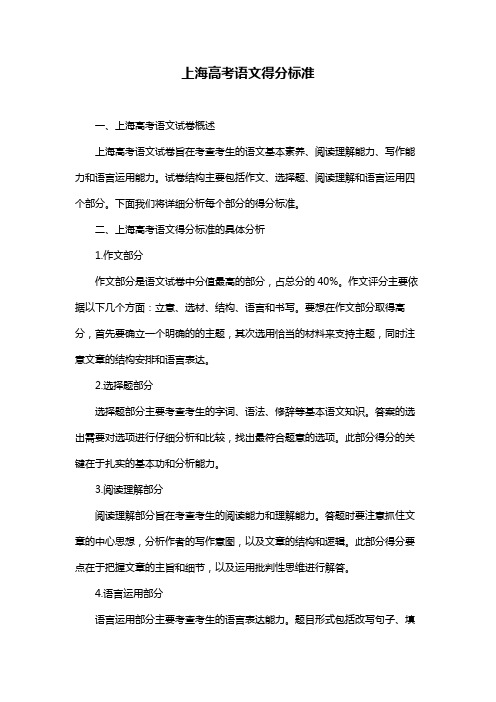
上海高考语文得分标准一、上海高考语文试卷概述上海高考语文试卷旨在考查考生的语文基本素养、阅读理解能力、写作能力和语言运用能力。
试卷结构主要包括作文、选择题、阅读理解和语言运用四个部分。
下面我们将详细分析每个部分的得分标准。
二、上海高考语文得分标准的具体分析1.作文部分作文部分是语文试卷中分值最高的部分,占总分的40%。
作文评分主要依据以下几个方面:立意、选材、结构、语言和书写。
要想在作文部分取得高分,首先要确立一个明确的的主题,其次选用恰当的材料来支持主题,同时注意文章的结构安排和语言表达。
2.选择题部分选择题部分主要考查考生的字词、语法、修辞等基本语文知识。
答案的选出需要对选项进行仔细分析和比较,找出最符合题意的选项。
此部分得分的关键在于扎实的基本功和分析能力。
3.阅读理解部分阅读理解部分旨在考查考生的阅读能力和理解能力。
答题时要注意抓住文章的中心思想,分析作者的写作意图,以及文章的结构和逻辑。
此部分得分要点在于把握文章的主旨和细节,以及运用批判性思维进行解答。
4.语言运用部分语言运用部分主要考查考生的语言表达能力。
题目形式包括改写句子、填空、翻译等。
要想在此部分取得高分,需要熟练掌握各类句型和表达方式,同时注意语言的准确性和流畅性。
三、提升语文得分策略1.扎实基本功:熟练掌握字词、语法、修辞等基本语文知识。
2.培养阅读习惯:多阅读优秀文章,提高阅读速度和理解能力。
3.注重写作训练:多进行写作练习,提高作文水平和表达能力。
4.加强语言实践:在日常生活中多进行语言交流,提高语言运用能力。
四、总结上海高考语文试卷的得分标准涵盖了基础知识、阅读理解、写作和语言运用等多个方面。
要想在语文考试中取得高分,关键在于扎实的基本功、良好的阅读习惯、较高的写作水平和语言运用能力。
上海高考英语作文评分标准及细则
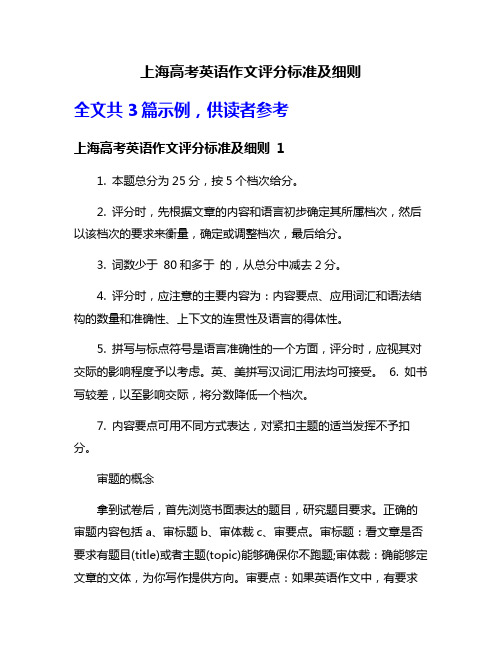
上海高考英语作文评分标准及细则全文共3篇示例,供读者参考上海高考英语作文评分标准及细则11. 本题总分为25分,按5个档次给分。
2. 评分时,先根据文章的内容和语言初步确定其所属档次,然后以该档次的要求来衡量,确定或调整档次,最后给分。
3. 词数少于80和多于的,从总分中减去2分。
4. 评分时,应注意的主要内容为:内容要点、应用词汇和语法结构的数量和准确性、上下文的连贯性及语言的得体性。
5. 拼写与标点符号是语言准确性的一个方面,评分时,应视其对交际的影响程度予以考虑。
英、美拼写汉词汇用法均可接受。
6. 如书写较差,以至影响交际,将分数降低一个档次。
7. 内容要点可用不同方式表达,对紧扣主题的适当发挥不予扣分。
审题的概念拿到试卷后,首先浏览书面表达的题目,研究题目要求。
正确的审题内容包括a、审标题b、审体裁c、审要点。
审标题:看文章是否要求有题目(title)或者主题(topic)能够确保你不跑题;审体裁:确能够定文章的文体,为你写作提供方向。
审要点:如果英语作文中,有要求要点的,一般打分时是踩点给分的.,准确把握住要点,是高分的一个诀窍。
如何审要点?要做到以下两个方面:总结归纳要点:不是所有内容都要写出来,而是抓住其中的关键要点、衔接要点!理顺要点:将提炼的要点按逻辑关系(如时间关系、因果关系、转折关系等)重新安排,这样整文章看起来就整体有序,流畅自然,更加容易打动评分老师,从而作文分数提升一档。
构思文章提纲:根据题目的要点,安排好段落和主次关系。
要形成良好的分段意识,写作分段是必须要进行的(2至4段为佳),这样显得文章不会拥挤并且层次分明。
在行文意识上,要注意突出要点。
评分细则优秀(22--25):紧扣主题,覆盖所有要点,内容充实;语法结构多样,词汇丰富,行文流畅,显示出较强的语言运用能力,允许有个别语言错误,但不影响意思表达。
良好(18--21):紧扣主题,覆盖所有要点,内容较充实,行文较流畅,语言有少量错误,但基本不影响意思表达。
上海高考作文评分标准
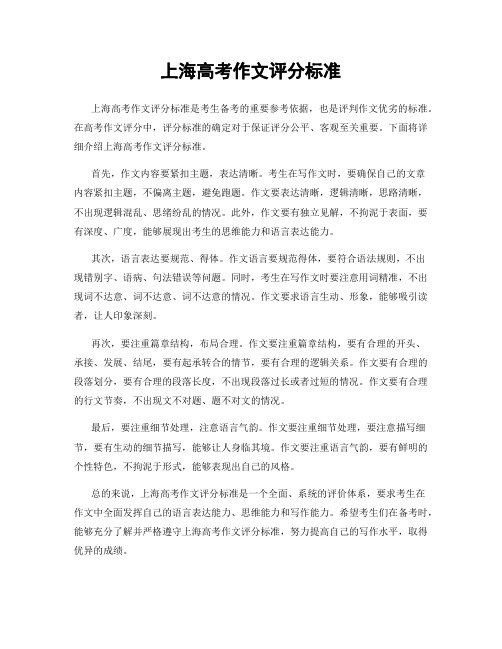
上海高考作文评分标准上海高考作文评分标准是考生备考的重要参考依据,也是评判作文优劣的标准。
在高考作文评分中,评分标准的确定对于保证评分公平、客观至关重要。
下面将详细介绍上海高考作文评分标准。
首先,作文内容要紧扣主题,表达清晰。
考生在写作文时,要确保自己的文章内容紧扣主题,不偏离主题,避免跑题。
作文要表达清晰,逻辑清晰,思路清晰,不出现逻辑混乱、思绪纷乱的情况。
此外,作文要有独立见解,不拘泥于表面,要有深度、广度,能够展现出考生的思维能力和语言表达能力。
其次,语言表达要规范、得体。
作文语言要规范得体,要符合语法规则,不出现错别字、语病、句法错误等问题。
同时,考生在写作文时要注意用词精准,不出现词不达意、词不达意、词不达意的情况。
作文要求语言生动、形象,能够吸引读者,让人印象深刻。
再次,要注重篇章结构,布局合理。
作文要注重篇章结构,要有合理的开头、承接、发展、结尾,要有起承转合的情节,要有合理的逻辑关系。
作文要有合理的段落划分,要有合理的段落长度,不出现段落过长或者过短的情况。
作文要有合理的行文节奏,不出现文不对题、题不对文的情况。
最后,要注重细节处理,注意语言气韵。
作文要注重细节处理,要注意描写细节,要有生动的细节描写,能够让人身临其境。
作文要注重语言气韵,要有鲜明的个性特色,不拘泥于形式,能够表现出自己的风格。
总的来说,上海高考作文评分标准是一个全面、系统的评价体系,要求考生在作文中全面发挥自己的语言表达能力、思维能力和写作能力。
希望考生们在备考时,能够充分了解并严格遵守上海高考作文评分标准,努力提高自己的写作水平,取得优异的成绩。
上海高考英语作文评分标准
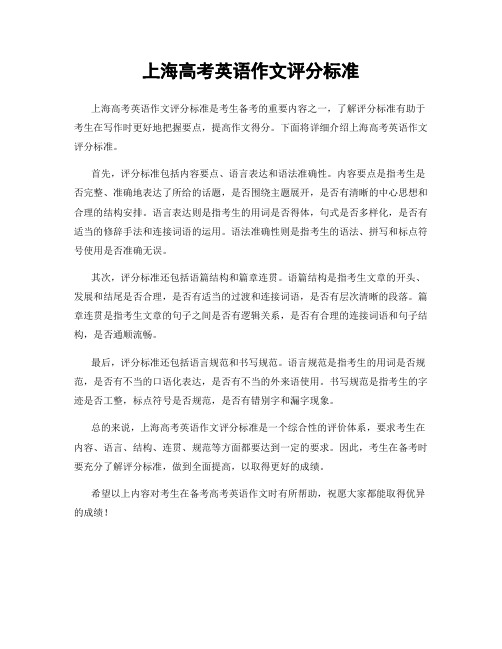
上海高考英语作文评分标准
上海高考英语作文评分标准是考生备考的重要内容之一,了解评分标准有助于考生在写作时更好地把握要点,提高作文得分。
下面将详细介绍上海高考英语作文评分标准。
首先,评分标准包括内容要点、语言表达和语法准确性。
内容要点是指考生是否完整、准确地表达了所给的话题,是否围绕主题展开,是否有清晰的中心思想和合理的结构安排。
语言表达则是指考生的用词是否得体,句式是否多样化,是否有适当的修辞手法和连接词语的运用。
语法准确性则是指考生的语法、拼写和标点符号使用是否准确无误。
其次,评分标准还包括语篇结构和篇章连贯。
语篇结构是指考生文章的开头、发展和结尾是否合理,是否有适当的过渡和连接词语,是否有层次清晰的段落。
篇章连贯是指考生文章的句子之间是否有逻辑关系,是否有合理的连接词语和句子结构,是否通顺流畅。
最后,评分标准还包括语言规范和书写规范。
语言规范是指考生的用词是否规范,是否有不当的口语化表达,是否有不当的外来语使用。
书写规范是指考生的字迹是否工整,标点符号是否规范,是否有错别字和漏字现象。
总的来说,上海高考英语作文评分标准是一个综合性的评价体系,要求考生在内容、语言、结构、连贯、规范等方面都要达到一定的要求。
因此,考生在备考时要充分了解评分标准,做到全面提高,以取得更好的成绩。
希望以上内容对考生在备考高考英语作文时有所帮助,祝愿大家都能取得优异的成绩!。
上海高考作文评分细则

上海高考作文评分细则一、议论类文体一类卷(63—70分)总体标准能准确把握题意,立意深刻,选材适当,中心突出,内容充实,感情真挚,结构严谨,有新意,有文采。
补充细则一类上(68—70):符合总体标准并具备以下一项者:1、能从题意中引发深刻的道理,文采优美的。
2、能从题意中引发深刻的道理,语言朴实无华而有一定功力的。
3、在文体应用、立意、构思等某一方面有创新的。
一类中(65—67):基本符合总体标准并具备以下一项者:1、能从题意中引出有深度的道理,但结构或语言等方面略有瑕疵的。
2、在立意、结构、文体某一方面有创新,但结构或语言等方面略有瑕疵的。
一类下(63—64):符合总体标准并具备以下条件者:能从题意中引出有意义的道理,但结构或语言等方面略有瑕疵的。
二类卷(52—62分)总体标准符合题意,立意较深刻,选材较适当,中心明确,内容较充实,感情真挚,结构完整,语言通顺。
补充细则二类上(59—62):基本符合总体标准并具备以下一项者:1、能从题意中引出有意义的道理。
2、有灵气、有新意,但在内容、结构、语言某一方面有不足的。
二类中(55—58):基本符合总体标准并具备以下条件者:1、能从题意中引出一定的道理。
2、有灵气、有新意,但在内容、结构、语言某一方面有不足的。
3、新意不够,但平稳充实的。
二类下(52—54):基本符合总体标准并具备以下一项者:能从题意中总结出一定的道理,但语言有华而不实之处的。
三类卷(39—51分)总体标准基本符合题意,立意一般,选材尚恰当,中心尚明确,内容尚充实,感情尚真挚,结构基本完整,语言基本通顺,偶有语病。
补充细则三类上(48—51):基本符合总体标准且不就事论事的。
三类中(44—47):符合总体标准但有就事论事或故意拔高(升华不自然)之感的。
三类下(39—43):符合总体标准但罗列现象,泛泛而谈,缺乏思考或认识肤浅的。
四类卷(21—38分)总体标准偏离题意,立意或选材不当,中心不明确,内容单薄,结构不够完整,语言欠通顺,语病较多。
上海高考作文评分标准细则2023年(高考作文评分标准及等级)

上海高考作文评分标准细则2023年(高考作文评分标准及等级)很多高考考生不知道高考作文的评分标准,写作文的时候做不到有的放矢。
1、上海高考作文评分标准说明一、内容项(一)一等符合题意:凡是在材料内容及含义范围内行文的中心突出:凡是紧紧围绕主题构思行文的内容充实:凡是材料丰富,表现主题的思想健康:凡是思想倾向积极健康的感情真挚:凡是行文合情入理的(二)二等符合题意:凡是在材料内容及含义范围内行文的中心明确:凡是能围绕主题构思行文的内容较充实:材料能基本表现主题思想健康:凡是思想倾向积极健康的感情真实:凡是行文朴实,不造作(三)三等基本符合题意:尚能把握材料含义,但行文中有所游离中心基本明确:尚有中心,但部分材料游离中心之外内容单薄:虽有材料,但不足以表现主题思想基本健康:凡思想倾向基本符合道德规范的感情基本真实:行文有造作痕迹(四)四等偏离题意:仅抓材料中枝节意义行文中心不明确:没有一个明确的主题内容不当:所选材料不能表现主题思想不健康:凡思想观点有悖于现行法律和道德规范的感情虚假:行文矫揉造作注:1、内容评分以题意、中心、内容为重点,参照思想、感情在等内浮动2、四等卷中,凡各项均符合该等要求,字数800字以上,在3—5内给分,不是空白卷不给零分。
二、表达项(一)一等符合文体要求:文体特征明显结构严谨:首尾呼应,文脉畅通,段落划分恰当,衔接紧凑,过渡自然的语言流畅:能使用规范的现代汉语写作,用词准确,句与句之间衔接自然,句式选择得当字迹工整:字迹工整,书写规范(二)二等符合文体要求:文体特征明显结构完整:有头有尾,分段合理语言流畅:文从字顺,有一到两处语病,但不影响语意表达字迹清楚:字迹较规范,易辨认(三)三等基本符合文体要求:有问题杂糅痕迹,但尚能分辨出文体类型结构基本完整:有头有尾,段落划分不够合理语言基本通顺:有三到四处语病,对语意表达并无很大影响字迹基本清楚:字迹不够规范,尚能辨认(四)四等不符合文体要求:不能辨认文体类型结构混乱:段落划分有严重缺陷,杂乱无章语言不通顺:语病多:语病达5处以上,影响了语意表达字迹潦草难辨:字迹潦草,难辨认,影响作文评卷注:1、表达项以文体、语言为重点,全面衡量,参照结构字体,在等内上下浮动2、四等卷中,凡各项指标均符合该等要求,字数满800,在3-5分内给分,不是空白不给0分3、注意文体意识。
上海高考作文评分标准
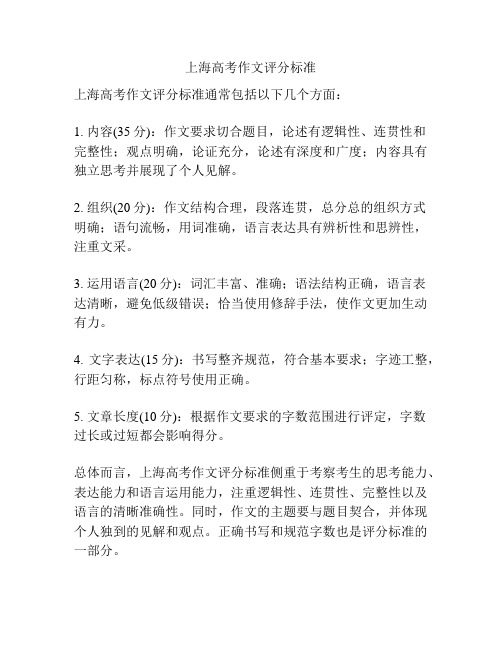
上海高考作文评分标准
上海高考作文评分标准通常包括以下几个方面:
1. 内容(35分):作文要求切合题目,论述有逻辑性、连贯性和
完整性;观点明确,论证充分,论述有深度和广度;内容具有独立思考并展现了个人见解。
2. 组织(20分):作文结构合理,段落连贯,总分总的组织方式
明确;语句流畅,用词准确,语言表达具有辨析性和思辨性,注重文采。
3. 运用语言(20分):词汇丰富、准确;语法结构正确,语言表
达清晰,避免低级错误;恰当使用修辞手法,使作文更加生动有力。
4. 文字表达(15分):书写整齐规范,符合基本要求;字迹工整,行距匀称,标点符号使用正确。
5. 文章长度(10分):根据作文要求的字数范围进行评定,字数
过长或过短都会影响得分。
总体而言,上海高考作文评分标准侧重于考察考生的思考能力、表达能力和语言运用能力,注重逻辑性、连贯性、完整性以及语言的清晰准确性。
同时,作文的主题要与题目契合,并体现个人独到的见解和观点。
正确书写和规范字数也是评分标准的一部分。
上海市语文高考作文评分细则
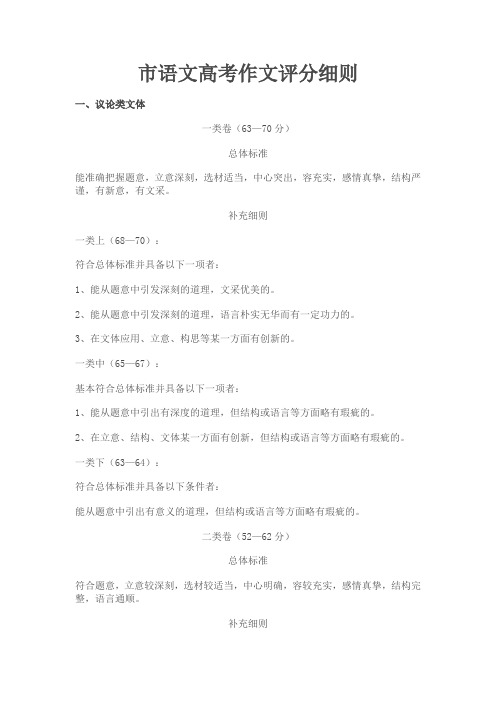
市语文高考作文评分细则一、议论类文体一类卷(63—70分)总体标准能准确把握题意,立意深刻,选材适当,中心突出,容充实,感情真挚,结构严谨,有新意,有文采。
补充细则一类上(68—70):符合总体标准并具备以下一项者:1、能从题意中引发深刻的道理,文采优美的。
2、能从题意中引发深刻的道理,语言朴实无华而有一定功力的。
3、在文体应用、立意、构思等某一方面有创新的。
一类中(65—67):基本符合总体标准并具备以下一项者:1、能从题意中引出有深度的道理,但结构或语言等方面略有瑕疵的。
2、在立意、结构、文体某一方面有创新,但结构或语言等方面略有瑕疵的。
一类下(63—64):符合总体标准并具备以下条件者:能从题意中引出有意义的道理,但结构或语言等方面略有瑕疵的。
二类卷(52—62分)总体标准符合题意,立意较深刻,选材较适当,中心明确,容较充实,感情真挚,结构完整,语言通顺。
补充细则二类上(59—62):基本符合总体标准并具备以下一项者:1、能从题意中引出有意义的道理。
2、有灵气、有新意,但在容、结构、语言某一方面有不足的。
二类中(55—58):基本符合总体标准并具备以下条件者:1、能从题意中引出一定的道理。
2、有灵气、有新意,但在容、结构、语言某一方面有不足的。
3、新意不够,但平稳充实的。
二类下(52—54):基本符合总体标准并具备以下一项者:能从题意中总结出一定的道理,但语言有华而不实之处的。
三类卷(39—51分)总体标准基本符合题意,立意一般,选材尚恰当,中心尚明确,容尚充实,感情尚真挚,结构基本完整,语言基本通顺,偶有语病。
补充细则三类上(48—51):基本符合总体标准且不就事论事的。
三类中(44—47):符合总体标准但有就事论事或故意拔高(升华不自然)之感的。
三类下(39—43):符合总体标准但罗列现象,泛泛而谈,缺乏思考或认识肤浅的。
四类卷(21—38分)总体标准偏离题意,立意或选材不当,中心不明确,容单薄,结构不够完整,语言欠通顺,语病较多。
上海高考英语作文评分标准及细则
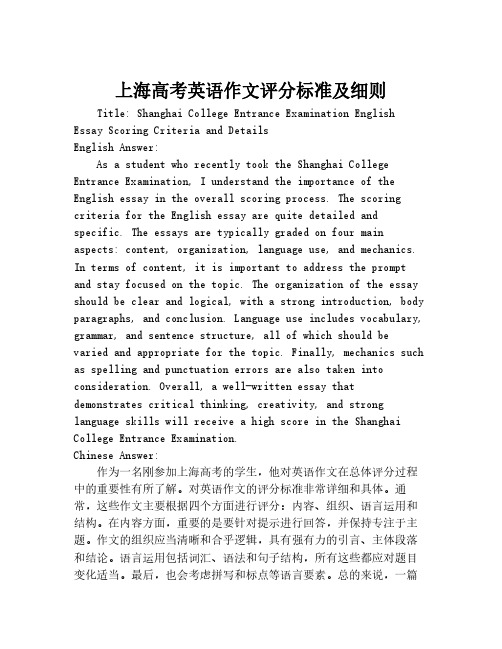
上海高考英语作文评分标准及细则Title:Shanghai College Entrance Examination English Essay Scoring Criteria and DetailsEnglish Answer:As a student who recently took the Shanghai College Entrance Examination,I understand the importance of the English essay in the overall scoring process.The scoring criteria for the English essay are quite detailed and specific.The essays are typically graded on four main aspects:content,organization,language use,and mechanics. In terms of content,it is important to address the prompt and stay focused on the topic.The organization of the essay should be clear and logical,with a strong introduction,body paragraphs,and nguage use includes vocabulary, grammar,and sentence structure,all of which should be varied and appropriate for the topic.Finally,mechanics such as spelling and punctuation errors are also taken into consideration.Overall,a well-written essay that demonstrates critical thinking,creativity,and strong language skills will receive a high score in the Shanghai College Entrance Examination.Chinese Answer:作为一名刚参加上海高考的学生,他对英语作文在总体评分过程中的重要性有所了解。
上海高考作文评分细则

上海高考作文评分细则 Modified by JEEP on December 26th, 2020.上海市高考作文评分细则一、议论类文体一类卷(63—70分)总体标准能准确理解材料,角度恰当,立意深刻,中心突出,内容充实,感情真挚,结构严谨。
有新意,有文采。
补充细则一类上(68—70):符合总体标准并具备以下一项者:1.能从材料中引发深刻的道理并富有说服力,文采优美的。
2.能从材料中引发深刻的道理并富有说服力,语言朴实无华而有一定功力的。
3.在立意、构思、文体应用等某一方面有创新的。
3.思考角度独特且富有说服力的。
一类中(65—67):基本符合总体标准并具备以下条件者:1.能从材料中引出有深度的道理,但结构或语言等方面略有不足的。
2.在立意、思考角度、结构、文体某一方面有创新,但结构或语言等方面略有不足的。
一类下(63—64):符合总体标准并具备以下条件者:能从题意中引出有意义的道理,角度比较独特,但在结构或语言等方面略有不足的。
二类卷(52—62分)总体标准理解材料基本准确,角度较恰当,立意较深刻,中心明确,内容较充实,感情真实,结构完整,语言通顺。
补充细则二类上(59—62):基本符合总体标准并具备以下条件者:有灵气、有新意,但在思想内容、行文结构、语言表达等某一方面有不足的。
二类中(55—58):基本符合总体标准并具备以下一项者:1.有独特的思考,但在思想内容、行文结构、语言表达等某一方面有缺陷的。
2.新意不够,但平稳充实的。
二类下(52—54):基本符合总体标准三类卷(40—51分)总体标准尚能理解材料,角度尚恰当,立意一般,中心尚明确,内容尚充实,感情尚真实,结构基本完整,语言基本通顺,偶有语病。
补充细则三类上(48—51):符合总体标准。
三类中(44—47):符合总体标准但故意拔高(升华不自然)之感的。
三类下(40—43):符合总体标准但罗列现象,泛泛而谈,缺乏思考或认识肤浅的。
四类卷(21—39分)总体标准偏离材料,角度或立意不当,中心不明确,内容单薄,结构不够完整,语言欠通顺,语病较多。
上海三校生高考语文作文评分标准

上海三校生高考语文作文评分标准
《说说上海三校生高考语文作文评分标准那些事儿》
嘿呀,咱们今儿来聊聊上海三校生高考语文作文评分标准哈。
你们知道不,这评分标准可挺重要呢!
我记得有一次啊,我去参加了一场模拟考试,就是考三校生高考的那种。
交了语文卷子后就特别好奇老师到底会怎么给作文打分。
等卷子发下来一看呀,我那篇作文的分数,哎呀,不咋高。
我就开始琢磨了,为啥呢这是?仔细研究了一下,才发现原来好多地方我没整明白啊。
比如说吧,字数不够!本来咱写的时候觉着差不多了呀,结果一对照标准,还差好多字呢!就像人家要求盖一间大房子,结果我费了半天劲就盖了个小茅屋,这能行吗?肯定不行呀!还有啊,内容上也不够丰富,就干巴巴地讲了点事儿,没什么细节描写,这样人家评分老师看着也没滋没味的呀!就好比吃饭,只有白米饭,没有菜,那多单调啊。
再有呢,语言也太普通了,没啥文采,平淡得像白开水似的。
所以呀,从那以后我就知道了,要想在上海三校生高考语文作文里拿高分,就得按照那些个标准来。
字数得够呀,不能偷工减料;内容得丰富,细
节得多多,要让评分老师像看精彩电视剧似的入迷;语言也得好好打磨,加点调料,变得有滋有味的。
总之呢,咱得重视这上海三校生高考语文作文评分标准,好好琢磨,努力朝着标准前进,这样才有可能在考场上写出让老师满意的好作文呀!嘿嘿!。
上海高考英文作文评分细则
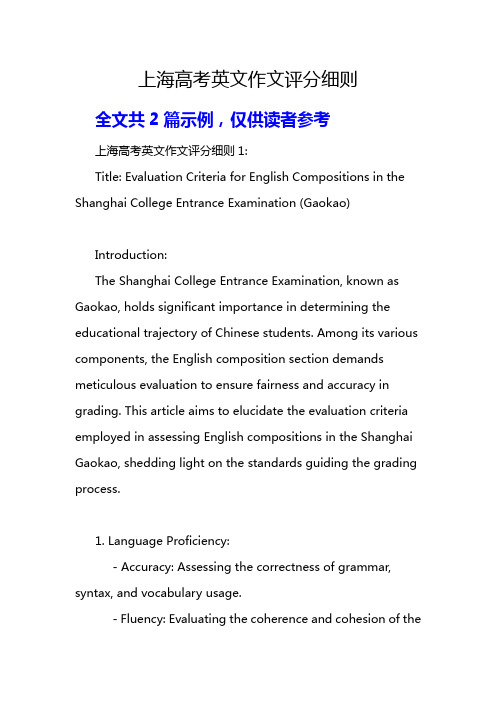
上海高考英文作文评分细则全文共2篇示例,仅供读者参考上海高考英文作文评分细则1:Title: Evaluation Criteria for English Compositions in the Shanghai College Entrance Examination (Gaokao)Introduction:The Shanghai College Entrance Examination, known as Gaokao, holds significant importance in determining the educational trajectory of Chinese students. Among its various components, the English composition section demands meticulous evaluation to ensure fairness and accuracy in grading. This article aims to elucidate the evaluation criteria employed in assessing English compositions in the Shanghai Gaokao, shedding light on the standards guiding the grading process.1. Language Proficiency:- Accuracy: Assessing the correctness of grammar, syntax, and vocabulary usage.- Fluency: Evaluating the coherence and cohesion of thecomposition, including smooth transitions between ideas and paragraphs.- Range of Vocabulary: Gauging the diversity and appropriateness of vocabulary employed in conveying ideas effectively.- Sentence Structure: Examining the complexity and variety of sentence structures utilized, including the use of clauses and phrases.2. Content Relevance:- Topic Relevance: Ensuring that the content is pertinent to the given topic or prompt, with clear alignment throughout the composition.- Depth of Ideas: Assessing the depth of analysis and insight demonstrated in addressing the topic, including the exploration of multiple perspectives where applicable.- Originality: Recognizing creative approaches and fresh insights that distinguish the composition from generic responses.- Supporting Details: Evaluating the inclusion of relevant examples, evidence, or anecdotes to bolster arguments and enrich content.3. Organization and Coherence:- Introduction: Evaluating the effectiveness of the introduction in setting the tone, establishing context, and presenting the main thesis or argument.- Body Paragraphs: Assessing the organization of ideas in logical sequences within each paragraph, with clear topic sentences and supporting details.- Conclusion: Examining the conclusion for its ability to summarize key points, reiterate the main argument, and provide closure to the composition.- Overall Coherence: Ensuring coherence and unity throughout the composition, with a consistent focus on the central theme or argument.4. Task Fulfillment:- Adherence to Instructions: Assessing the extent to which the composition adheres to the instructions provided, including word count limitations and specific requirements.- Addressing All Aspects of the Prompt: Ensuring comprehensive coverage of all aspects of the prompt or question posed.- Critical Thinking: Evaluating the depth of critical thinking demonstrated in analyzing the prompt and formulating a thoughtful response.Conclusion:The evaluation criteria outlined above serve as a framework for assessing English compositions in the Shanghai Gaokao, aiming to maintain consistency, fairness, and objectivity in grading. By emphasizing language proficiency, content relevance, organization, coherence, and task fulfillment, educators and examiners can effectively evaluate the English writing skills of students, thereby promoting excellence in language learning and academic achievement.上海高考英文作文评分细则2:Certainly! Here's a detailed scoring rubric for English essays in the Shanghai college entrance examination (高考):Shanghai College Entrance Examination English Essay Scoring RubricIntroduction:- The introduction effectively introduces the topic and provides context.- Clear thesis statement or main idea is presented.- Engaging opening that captures the reader's attention.Organization and Structure:- Clear and logical organization of ideas with awell-defined introduction, body paragraphs, and conclusion.- Smooth transitions between paragraphs and ideas.- Each paragraph focuses on a single main idea or argument.Content and Development:- Thorough coverage of the topic with relevant details and examples.- Ideas are developed with depth and insight.- Use of varied and appropriate vocabulary to express ideas.- Clear and coherent expression of thoughts and arguments.Language Use:- Effective and appropriate use of grammar and sentence structure.- Varied sentence structure to enhance readability and engagement.- Accurate and appropriate use of vocabulary.- Consistent and appropriate tone throughout the essay.Critical Thinking and Analysis:- Thoughtful analysis of the topic with original insights.- Demonstrates an understanding of complexities and nuances related to the topic.- Presents well-reasoned arguments and supports them with evidence.- Anticipates and addresses potential counterarguments or opposing viewpoints.Clarity and Coherence:- Ideas are presented clearly and coherently.- Consistent and focused development of ideas throughout the essay.- Clarity in conveying the writer's perspective andargument.Conclusion:- Summarizes key points and reiterates the thesis statement.- Provides closure to the essay by offering insights or implications for the future.- Leaves a lasting impression on the reader.Language Conventions:- Adherence to standard English grammar, punctuation, and spelling conventions.- Consistency in formatting and presentation of the essay.Overall Impression:- Overall impact of the essay on the reader.- Creativity, originality, and uniqueness of ideas presented.- Engagement with the topic and the reader throughout the essay.Scoring:- Each category will be scored on a scale of 1 to 5, with 5being the highest score.- Total score will be calculated by summing up the scores in each category.This scoring rubric aims to provide a comprehensive framework for evaluating English essays in the Shanghai college entrance examination. It emphasizes not only language proficiency but also critical thinking skills, creativity, and clarity of expression.。
高考作文评分标准09上海70分

高考作文评分标准基础等级50分一等(50—41)二等(40—31)三等(30—21)四等(20—0)切合题意符合题意基本符合题意偏离题意中心突出中心明确中心基本明确中心不明或立意不当内容充实内容较充实内容单薄没什么内容感情真切感情真实感情基本真实感情虚假结构严谨结构完整结构基本完整结构混乱语言流畅语言通顺语言基本通顺语病多字体工整字迹清楚字迹潦草字迹难辨符合文体要求大体符合文体要求大体符合文体要求不符合文体要求发展等级20分深刻丰富有文采有创新1、透过现象深入本质4、材料丰富7、语言生动,句式灵活10、见解新颖,材料新鲜、构思精巧2、揭示问题产生问题5、形象丰满8、善于运用修辞手法11、推理想象有独到之处3、观点具有启发作用6、意境深远9、文句有意蕴12、有个性特征[说明] 1. 基础等级评分以题意、内容、语言、文体为重点,全面衡量。
符合文体要求,指符合考生根据题意和内容自选的文体的要求。
2. 发展等级评分,依据12个评分点,不求全面,以一点突出者按等评分,直至满分。
3. 缺题目扣2分;每一个错别字扣1分,重复不计,扣满5分为止;不足字数(篇幅在2/3以上),每少50个字扣1分。
4.文章在基本切题的前提下,达到“三基本”(中心基本明确,结构基本完整,语言基本通顺)要求的,切入分为52。
在此基础上,只要发现有亮点,就应该将分数上浮。
一、关于议论类文章1.在切合题意的前提下,凡说理表达基本过关、观点基本突出、材料基本充实的议论类文章,可以按48—52分档次赋分。
2.凡在“三基本”的某一方面达到较好级别的,赋分可以提高一个档次,依次类推。
3.对于借助随笔、杂感甚至杂文样式表达思想阐发主张的议论类文章,要反复审读,谨慎赋分。
凡那些能够做到思想深刻、议论风生、纵横捭阖的特别优秀的文章,要敢于打高分,直至满分:凡那些只会借助随笔或杂文写作形式,而思想苍白、议论平淡、缺乏层次的文章,不能误判高分,而只能按一般议论类的文章标准去如实赋分。
上海高考英语作文评分标准及细则

上海高考英语作文评分标准及细则Shanghai College Entrance Examination: English Writing Evaluation Criteria and DetailsThe Shanghai College Entrance Examination, also known as the Gaokao, is a crucial step in the academic journey of Chinese students. Among the various subjects tested, English is considered one of the core subjects, and the English writing section holds significant weight in the overall evaluation. In order to ensure fairness and accuracy in grading, specific evaluation criteria and details have been established for grading English writing compositions.Evaluation Criteria:1. Content (40%): The content of the essay should be relevant, clear, and organized. It should address the topic effectively and provide insightful arguments and analysis. The essay should demonstrate a strong understanding of the topic and a logical development of ideas.2. Language Use (30%): This criterion evaluates the use of vocabulary, grammar, and sentence structure. Candidates are expected to use a wide range of vocabulary and demonstrateaccuracy in grammar and sentence structure. The language should be clear, concise, and appropriate for the task.3. Organization (20%): The essay should be well-organized with a clear introduction, body paragraphs, and conclusion. The ideas should be logically connected, and transitions should be used effectively to guide the reader through the essay.4. Creativity (10%): This criterion evaluates the originality and creativity of the essay. Candidates are encouraged to present unique perspectives, ideas, or arguments in their writing. Creative use of language and engaging storytelling can enhance the overall impact of the essay.Evaluation Details:1. Content: Examiners will assess the relevance and depth of the content, looking for a thorough understanding of the topic and thoughtful analysis. Candidates should support their arguments with specific examples, evidence, or personal experiences.2. Language Use: Examiners will evaluate the use of vocabulary, grammar, and sentence structure. Common errors to avoid include spelling mistakes, incorrect word usage, andawkward phrasing. Candidates should strive for clarity, accuracy, and precision in their language use.3. Organization: Examiners will assess the overall structure and coherence of the essay. Candidates should pay attention to paragraph development, topic sentences, and transitions between paragraphs. A well-organized essay is easier to follow and makes a stronger impression on the reader.4. Creativity: Examiners will look for originality and creativity in the essay. Candidates can incorporate creative writing techniques, such as vivid descriptions, figurative language, or dialogue, to make their writing more engaging. A unique perspective or idea can set the essay apart and leave a lasting impression.In conclusion, the evaluation criteria and details for grading English writing compositions in the Shanghai College Entrance Examination are designed to assess the candidate's ability to communicate effectively, think critically, and express ideas clearly and persuasively. By focusing on content, language use, organization, and creativity, examiners can provide a fair and comprehensive assessment of the candidate's writing skills. Candidates are advised to practice writing regularly, seekfeedback, and strive for improvement in all areas of writing to achieve success in the Gaokao.。
上海高考英语作文评分标准及细则

上海高考英语作文评分标准及细则The Big Important Rules for Writing Amazing English EssaysHey there, kids! Are you ready to learn all about the super cool rules for writing awesome English essays? I know, I know, essays can be kind of boring. But trust me, if you follow these rules, your essays are gonna be so good that your teachers will be jumping for joy!First things first, let's talk about the most important part of any essay: the content! That's just a fancy word for what your essay is actually about. The people who score your essays (we'll call them the "graders") are looking for a few key things when it comes to content.Does your essay actually answer the question or prompt that was given? It's like if your mom asks you to clean your room, and instead you go outside and play. That's not gonna fly with the graders! You gotta stay on topic and directly respond to the question or prompt.Do you have enough details and examples to support your main ideas? It's not enough to just say "puppies are cute." You gotta give reasons why, like "puppies are cute because they havefloppy ears and wagging tails." The more details and examples you can pack in, the better!Are your ideas well-organized and easy to follow? Nobody likes a messy, jumbled-up essay. You gotta have a clear introduction, body paragraphs, and conclusion. It should flow smoothly from one idea to the next, kind of like a fun story!Okay, now let's move on to the language and vocabulary you use in your essay. This is where things can get a little tricky, but don't worry, I've got your back!Are you using a good variety of vocabulary words? The graders love it when you show off your impressive English skills by using lots of different, interesting words. But be careful not to use words you don't really understand – that's a big no-no!Are your sentences varied and not too simple or repetitive? Mixing up your sentence structures keeps things interesting and shows that you really know your stuff. Instead of saying "I like dogs. Dogs are fun. Dogs are cute," try something like "The energetic, playful dogs always bring a smile to my face with their adorable antics."Are you using proper grammar, spelling, and punctuation? This one is super important! The graders are total grammar nerds,so you gotta make sure your essay is free of any silly mistakes. Double-check that you're using the right verb tenses, capitalization, and all those pesky commas and periods.Last but not least, let's talk about the overall organization and presentation of your essay.Does your essay have a clear introduction that grabs the reader's attention and states your main idea? You want to hook the graders right from the start with an interesting opener, kind of like a good book or movie!Are your body paragraphs well-developed and focused on one main idea each? Each paragraph should have a clear topic sentence, supporting details, and a concluding sentence. It's like a little mini-essay inside your big essay!Does your conclusion wrap everything up nicely and restate your main points? You want to leave the graders feeling satisfied and impressed with your brilliant writing skills!Is your essay the right length and formatted correctly? The graders have specific guidelines for how long your essay should be and how it should be formatted (like double-spacing and stuff). Make sure you follow those rules to a T!Phew, that's a lot of rules to remember! But don't worry, with a little practice and some hard work, you'll be writing essays that are so good, they'll blow the graders' minds! Just remember to stay focused, use lots of details and examples, vary your language, and organize everything nice and neatly. You've got this!Now, who's ready to impress their teachers and become the essay-writing champion of the world? Let's do this!。
上海高考英语作文评分标准
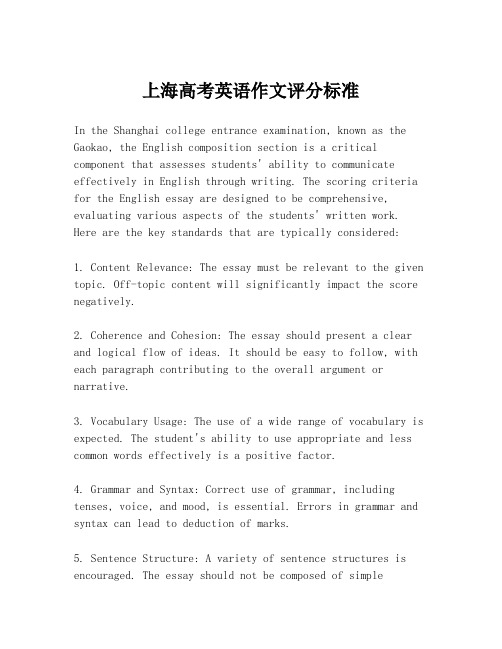
上海高考英语作文评分标准In the Shanghai college entrance examination, known as the Gaokao, the English composition section is a critical component that assesses students' ability to communicate effectively in English through writing. The scoring criteria for the English essay are designed to be comprehensive, evaluating various aspects of the students' written work. Here are the key standards that are typically considered:1. Content Relevance: The essay must be relevant to the given topic. Off-topic content will significantly impact the score negatively.2. Coherence and Cohesion: The essay should present a clear and logical flow of ideas. It should be easy to follow, with each paragraph contributing to the overall argument or narrative.3. Vocabulary Usage: The use of a wide range of vocabulary is expected. The student's ability to use appropriate and less common words effectively is a positive factor.4. Grammar and Syntax: Correct use of grammar, including tenses, voice, and mood, is essential. Errors in grammar and syntax can lead to deduction of marks.5. Sentence Structure: A variety of sentence structures is encouraged. The essay should not be composed of simplesentences only; complex and compound sentences should be used to demonstrate control over language.6. Spelling and Punctuation: Spelling mistakes and incorrect punctuation can detract from the overall quality of the essay.7. Originality and Creativity: While the essay must adhere to the prompt, original ideas and creative approaches to thetopic are valued.8. Task Response: The essay should fully address the task requirements. Failure to do so can result in a lower score.9. Word Count: The essay should meet the minimum word count requirement without exceeding the maximum limit, if any.10. Mechanics of Writing: This includes the overall presentation, such as handwriting or typing quality, whichcan influence the readability and thus the score.11. Evidence of Research: For some types of essays,particularly argumentative or informative pieces, evidence of research and the use of sources can enhance the essay's credibility.12. Critical Thinking: The ability to analyze and evaluate different viewpoints or arguments is highly regarded in the essay.13. Conclusion Effectiveness: A strong conclusion that summarizes the main points and provides a sense of closure isessential.14. Adherence to Instructions: The essay must follow any specific instructions given in the prompt, such as the use of a particular format or addressing specific questions.15. Overall Impression: The final score also takes into account the overall impression the essay makes on the reader, including the engagement level and the persuasiveness of the writing.It's important to note that while these standards are generally applied, the specific weight given to eachcriterion may vary slightly from year to year or between different examiners. However, focusing on these areas during preparation can significantly improve a student's performance in the English essay section of the Gaokao.。
上海高考作文评分细则
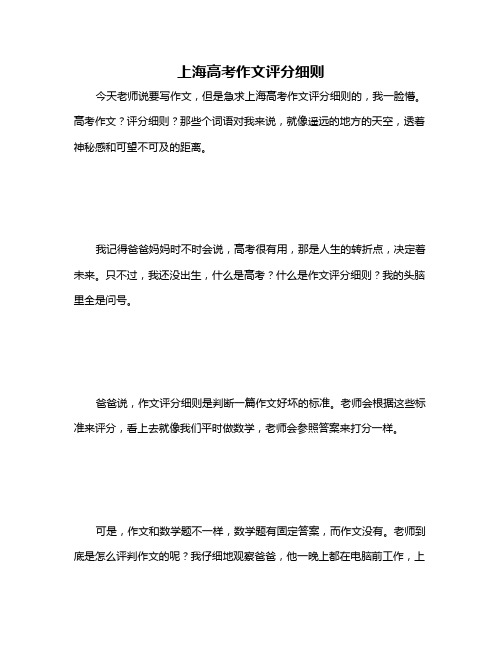
上海高考作文评分细则
今天老师说要写作文,但是急求上海高考作文评分细则的,我一脸懵。
高考作文?评分细则?那些个词语对我来说,就像遥远的地方的天空,透着神秘感和可望不可及的距离。
我记得爸爸妈妈时不时会说,高考很有用,那是人生的转折点,决定着未来。
只不过,我还没出生,什么是高考?什么是作文评分细则?我的头脑里全是问号。
爸爸说,作文评分细则是判断一篇作文好坏的标准。
老师会根据这些标准来评分,看上去就像我们平时做数学,老师会参照答案来打分一样。
可是,作文和数学题不一样,数学题有固定答案,而作文没有。
老师到底是怎么评判作文的呢?我仔细地观察爸爸,他一晚上都在电脑前工作,上
面有许许多多的文字。
很可能,写作文就像爸爸一样,把自己的想法写完整,让别人清楚。
我发现自己平时写作文的时候,总是东凑西拼,一直找不到思路。
老师经常会说我的作文没有中心思想,语言平淡,非常缺乏感情。
我总是懊丧地低着头,真不知道该如何才能写好作文。
现在我终于明白,写好作文需要勤思考,要表达自己的想法和感情,又要运用一些技巧,才能得到老师的认可。
我已经开始认真地阅读一些作文范文,学习别人的写作技巧。
我相信,如果我能坚持不懈地努力,一定能写出好作文,得到老师的肯定。
当然了,高考对我来说还很遥远,我现在需要把心思放在学习上,努力成为一个好学生,将来才能迎接高考的挑战。
上海高考英语作文评分标准及细则

全文分为作者个人简介和正文两个部分:作者个人简介:Hello everyone, I am an author dedicated to creating and sharing high-quality document templates. In this era of information overload, accurate and efficient communication has become especially important. I firmly believe that good communication can build bridges between people, playing an indispensable role in academia, career, and daily life. Therefore, I decided to invest my knowledge and skills into creating valuable documents to help people find inspiration and direction when needed.正文:上海高考英语作文评分标准及细则全文共3篇示例,供读者参考篇1The Shanghai College Entrance Examination: Navigating the English Writing RubricAs students in Shanghai, we all know the weight that the annual College Entrance Examination (Gaokao) carries. It's theculmination of years of hard work, late nights, and countless practice tests. And for many of us, the English writing section is one of the most daunting components of this high-stakes exam. With its complex rubric and stringent scoring criteria, it's no wonder that so many of us feel a sense of trepidation when we pick up our pens.But fear not, my fellow students! While the English writing rubric may seem like a labyrinth of rules and regulations, it's not as convoluted as it may appear at first glance. With a little bit of guidance and a whole lot of practice, we can demystify this scoring system and approach the writing section with confidence.First and foremost, let's break down the key components of the rubric. The English writing section is divided into three parts: content and organization, language use, and mechanics. Each of these categories carries a specific weight, and your overall score is a composite of your performance in each area.Content and Organization (40% of your total score)This section evaluates the substance of your writing, as well as its logical flow and coherence. The rubric looks at factors such as:Adherence to the prompt and task requirementsDevelopment of ideas and supporting detailsOrganizational structure and transitionsCohesiveness and logical progression of thoughtsTo excel in this category, you'll need to demonstrate a deep understanding of the writing prompt and the ability to craft a well-structured, cohesive response. Your ideas should be clearly articulated and supported with relevant examples or evidence. Effective use of transitions and a logical organizational structure are also crucial.Language Use (40% of your total score)While content is king, language use is the queen in this rubric. This section assesses your command of the English language, including:Accuracy and range of vocabularyGrammatical structures and sentence patternsEffective use of idioms and expressionsStyle and tone appropriate for the taskTo score well in this category, you'll need to demonstrate a strong grasp of English grammar, vocabulary, and idiomatic expressions. Your writing should flow smoothly, with varied sentence structures and a consistent, appropriate tone. Precise word choice and the judicious use of advanced vocabulary can also bolster your score.Mechanics (20% of your total score)The mechanics section may seem like the least significant component, but don't underestimate its importance. This category evaluates the technical aspects of your writing, including:SpellingPunctuationCapitalizationFormatting and presentationWhile these elements may seem minor, they can have a significant impact on the overall clarity and professionalism of your writing. Careful proofreading and attention to detail are essential for maximizing your score in this section.Now that we've dissected the rubric, let's talk about strategies for success. Practice, practice, practice! The more you write and receive feedback, the better you'll become at navigating the rubric's nuances. Seek out opportunities to have your writing critiqued by teachers, peers, or tutors, and use their feedback to refine your skills.Additionally, familiarize yourself with the types of prompts and tasks that are commonly featured on the exam. The more exposure you have to these prompts, the better prepared you'll be to craft well-structured, relevant responses.Another key strategy is to read widely and immerse yourself in high-quality English writing. Pay attention to the way ideas are developed, organized, and expressed in various genres and styles. This exposure will not only expand your vocabulary and understanding of idiomatic expressions but will also help you internalize the rhythms and cadences of effective writing.Finally, don't forget to manage your time wisely during the exam. The English writing section is often one of the mosttime-consuming components, so it's essential to pace yourself and allocate your time effectively. Consider practicing timed writing exercises to build your stamina and time management skills.My fellow students, the Shanghai College Entrance English Exam writing rubric may seem daunting, but with dedication, practice, and a solid understanding of its components, you can approach this challenge with confidence. Remember, the rubric is not a set of arbitrary rules; it's a framework designed to help you communicate your ideas clearly, effectively, and with sophistication.Embrace the rubric as a tool for growth andself-improvement, and use it as a guide to hone your writing skills. With perseverance and a willingness to learn, you can not only succeed on the exam but also develop a valuable skill that will serve you well throughout your academic and professional endeavors.So, pick up your pen, take a deep breath, and let your words flow. The path to success may be challenging, but with the right mindset and strategies, you can navigate the rubric and emerge victorious. Good luck, and may your words shine brightly on the page!篇2Decoding the Enigma: A Student's Perspective on the Shanghai Gaokao English Composition Scoring CriteriaAs students, the mere mention of the Gaokao English composition sends shivers down our spines. This high-stakes assessment holds the power to make or break our academic dreams, and the scoring criteria can often seem like an impenetrable enigma. However, understanding these guidelines is crucial for crafting a compelling and well-structured essay that resonates with the evaluators. In this article, I aim to demystify the Shanghai Gaokao English Composition Scoring Criteria and provide a student's perspective on navigating this daunting challenge.The Gaokao English composition is a formidable task that tests our ability to express complex ideas coherently and persuasively in a foreign language. The scoring criteria encompass a multitude of factors, ranging from content and organization to language proficiency and task fulfillment. Decoding these elements is akin to solving a intricate puzzle, where each piece holds equal importance in shaping the overall picture.Content and Substance: The Backbone of Your EssayAt the core of any successful composition lies a substantive and well-developed argument. The evaluators seek essays that demonstrate a profound understanding of the prompt,supported by relevant examples, facts, and insightful analysis. Merely regurgitating textbook information or stating the obvious is a surefire way to earn a mediocre score. Instead, we must strive to present a unique perspective, backed by logical reasoning and critical thinking.Organization and Coherence: Weaving a Seamless NarrativeA well-organized essay is akin to a meticulously crafted tapestry, where each thread contributes to the overall design. The scoring criteria place a strong emphasis on the logical flow of ideas, effective paragraph structure, and the use of appropriate transitions. A disjointed or haphazard arrangement of thoughts can undermine even the most compelling arguments, leaving the reader lost in a labyrinth of disorganized thoughts.Language Proficiency: Mastering the Art of ExpressionProficiency in English is the cornerstone of the Gaokao English composition. The evaluators scrutinize our command of vocabulary, grammar, and idiomatic expressions. Precise and sophisticated language usage can elevate our essays, while errors and inappropriate word choices can detract from the overall quality. Striking the right balance between simplicity andcomplexity is a delicate dance that requires practice and refinement.Task Fulfillment: Adhering to the PromptOne of the most common pitfalls students encounter is straying from the prompt or failing to address all its components. The scoring criteria place a premium on our ability to comprehend and respond to the prompt accurately and completely. Neglecting any aspect of the task or introducing irrelevant information can result in a substantial deduction of points, no matter how well-written the essay may be.The Shanghai Gaokao English Composition Scoring Criteria are intricate and multifaceted, but comprehending them is essential for success. As students, we must approach this challenge with diligence, creativity, and a Growth mindset. Mastering the art of composition requires consistent practice, feedback, and a willingness to learn from our mistakes.Embracing the Journey: Strategies for SuccessTo excel in the Gaokao English composition, we must adopt a holistic approach that encompasses both technical proficiency and personal growth. Here are some strategies that have proven invaluable in my journey:Read, read, and read some more: Immersing ourselves in exemplary writing is one of the most effective ways to improve our own composition skills. By analyzing the structure, language, and rhetorical devices employed by skilled writers, we can develop a keen eye for what constitutes a compelling essay.Practice, practice, practice: Writing is a skill that can only be honed through consistent practice. Engage in regular writing exercises, seek feedback from teachers and peers, and continuously refine your craft. Each practice session is an opportunity to identify areas for improvement and solidify your strengths.Cultivate critical thinking: A well-crafted essay is not merely a collection of words but a manifestation of critical thinking. Encourage intellectual curiosity, challenge assumptions, and approach topics from multiple perspectives. This mindset will not only enhance the depth of your arguments but also foster intellectual growth.Manage stress and cultivate resilience: The Gaokao English composition can be a daunting and anxiety-inducing task. Develop stress management techniques, such as mindfulness practices or physical exercise, to maintain a balanced andfocused mindset. Embrace setbacks as learning opportunities and cultivate resilience to bounce back from disappointments.Seek guidance and support: Don't hesitate to seek guidance from experienced teachers, tutors, or mentors. Their expertise and feedback can provide invaluable insights and help you identify blind spots in your writing. Additionally, collaborate with peers, engage in constructive discussions, and learn from one another's strengths and weaknesses.The Gaokao English composition is a formidable challenge, but it is also an opportunity to showcase our language proficiency, critical thinking abilities, and perseverance. By decoding the scoring criteria and adopting a strategic approach, we can transform this daunting task into a testament to our growth and resilience as students and individuals.Remember, the journey towards mastering the Gaokao English composition is not a sprint but a marathon. Embrace the process, learn from setbacks, and celebrate small victories along the way. With dedication, perseverance, and a growth mindset, we can unlock the enigma of the scoring criteria and craft essays that resonate with the evaluators and propel us towards academic success.篇3Shanghai Gaokao English Writing: Scoring Criteria UncoveredAs students diligently prepare for the all-important Gaokao, the English writing section looms large, casting a shadow of apprehension over many. The weight it carries in our overall scores only amplifies the pressure to excel. Yet, amidst the anxiety, understanding the scoring criteria can be a guiding light, illuminating the path to success. In this essay, I aim to demystify the intricate rubric employed by the esteemed evaluators, arming my fellow test-takers with invaluable insights.To begin, it is crucial to grasp the overarching structure of the scoring system. The English writing section is assessed on a scale of 0 to 25 points, with each point carrying significant weight in our final Gaokao scores. This numeric value is not arbitrarily assigned but rather a reflection of our mastery across several key domains.The first and arguably most pivotal domain is Content and Coherence, accounting for a maximum of 12 points. Herein lies the essence of our composition, the substance that breathes life into our words. The evaluators seek a clear and comprehensiveresponse to the given prompt, one that exhibits a logical flow of ideas and a cohesive narrative. Disjointed or tangential musings are swiftly penalized, as are compositions that fail to adequately address the crux of the prompt.Inextricably linked to content is the realm of Language and Vocabulary, which commands a maximum of 8 points. This domain scrutinizes our command of the English language, our ability to wield words with precision and nuance. A rich and varied lexicon is celebrated, as is the appropriate usage of idiomatic expressions and complex grammatical structures. Conversely, errors in spelling, syntax, and word choice can prove costly, eroding our hard-earned points.The final domain, Structure and Organization, carries a maximum of 5 points. This dimension assesses our prowess in crafting a well-structured essay, replete with a compelling introduction, a cogent body, and a resonant conclusion. The evaluators seek compositions that adhere to the conventions of formal writing, employing transitional phrases and logical paragraphing to guide the reader through our narrative.Yet, the scoring criteria extend far beyond these broad domains, delving into granular details that can make or break our compositions. For instance, the evaluators place a premiumon originality and creativity, rewarding compositions that showcase a unique perspective or a fresh approach to the prompt. Merely regurgitating stock phrases or rehashingwell-trodden ideas is a surefire path to mediocrity.Moreover, the evaluators are attuned to the subtle nuances of tone and register, seeking compositions that strike the appropriate balance between formality and approachability. An overly colloquial or conversational tone may be deemed inappropriate, while an excessively academic or pedantic style may likewise be penalized.It is also worth noting that the evaluators are not merely assessing our linguistic proficiency but also our critical thinking abilities. Compositions that exhibit a depth of thought, a willingness to grapple with complex ideas, and a capacity for nuanced analysis are highly prized. Superficial or cursory treatments of the prompt are likely to be met with disappointment.Furthermore, the evaluators are keenly aware of the pitfalls of plagiarism and will swiftly identify and penalize any instances of academic dishonesty. Borrowing ideas or passages from external sources without proper attribution is not only unethical but also a surefire way to incur severe penalties.As we navigate these intricate scoring criteria, it is essential to remember that the evaluators are not merely tallying points but rather seeking to celebrate the very best of our abilities. Their objective is not to trip us up or to set us up for failure but rather to challenge us to reach our fullest potential.In conclusion, the Shanghai Gaokao English writing scoring criteria may initially seem daunting, a labyrinth of interwoven domains and intricate details. Yet, by unpacking these criteria and understanding the underlying rationale, we can transform them from obstacles into guideposts, illuminating the path to success. With diligent preparation, a nuanced understanding of the evaluators' expectations, and an unwavering commitment to excellence, we can approach the English writing section with confidence, poised to showcase the full extent of our abilities.。
上海市高考作文评分标准

上海市高考作文评分标准
今天,我上语文课,老师说我们马上就要上初中了,初中生要考高中,高中生要考大学,大学的考试叫高考,高考作文很有用。
老师还说,上海高考作文有评分标准,但没说具体是什么。
我很想知道评分标准是什么,毕竟我感觉我的作文写得相当好,我很想拿高分。
我偶尔会写作文,但我会用很多漂亮的词语,我的作文里有许多开心的故事,也有很多伤心难过的事,还有我想说的秘密。
我问爸爸,爸爸说评分标准就是用来评判作文好坏的,大部分老师都用它来打分。
妈妈说评分标准是几个写作文的规则,要写得有逻辑,有内容,还要有感情。
我好像有点不开心,因为我感觉我的作文不够精彩,虽然也有感情,但爸爸妈妈说还要有逻辑和内容,我就不太确定怎么写才好。
我偷偷地看哥哥的作文,哥哥是初中生,他知道很多东西。
我发现哥哥的作文很长,有很多数字和例子,有一些不太容易理解的词语。
我有点畏缩,我的作文还没有那么多数字和例子,我该怎么办呢?我该怎么写才能拿高分呢?我不想输给哥哥。
老师说:“每个人都有自己的写作风格,不要害怕,只要认真用心写,就能写出好作文。
”我想,老师说得对,我要写出我的风格,写一段我的故事,写出我的快乐和悲伤。
下一次作文课的时候,我要认真听老师讲,我要努力写一篇好作文,我要考上好高中,我要考上好大学!。
上海语文作文评分标准
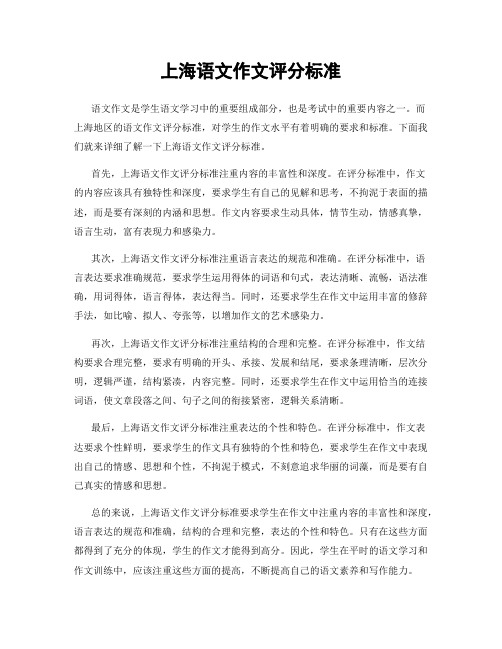
上海语文作文评分标准语文作文是学生语文学习中的重要组成部分,也是考试中的重要内容之一。
而上海地区的语文作文评分标准,对学生的作文水平有着明确的要求和标准。
下面我们就来详细了解一下上海语文作文评分标准。
首先,上海语文作文评分标准注重内容的丰富性和深度。
在评分标准中,作文的内容应该具有独特性和深度,要求学生有自己的见解和思考,不拘泥于表面的描述,而是要有深刻的内涵和思想。
作文内容要求生动具体,情节生动,情感真挚,语言生动,富有表现力和感染力。
其次,上海语文作文评分标准注重语言表达的规范和准确。
在评分标准中,语言表达要求准确规范,要求学生运用得体的词语和句式,表达清晰、流畅,语法准确,用词得体,语言得体,表达得当。
同时,还要求学生在作文中运用丰富的修辞手法,如比喻、拟人、夸张等,以增加作文的艺术感染力。
再次,上海语文作文评分标准注重结构的合理和完整。
在评分标准中,作文结构要求合理完整,要求有明确的开头、承接、发展和结尾,要求条理清晰,层次分明,逻辑严谨,结构紧凑,内容完整。
同时,还要求学生在作文中运用恰当的连接词语,使文章段落之间、句子之间的衔接紧密,逻辑关系清晰。
最后,上海语文作文评分标准注重表达的个性和特色。
在评分标准中,作文表达要求个性鲜明,要求学生的作文具有独特的个性和特色,要求学生在作文中表现出自己的情感、思想和个性,不拘泥于模式,不刻意追求华丽的词藻,而是要有自己真实的情感和思想。
总的来说,上海语文作文评分标准要求学生在作文中注重内容的丰富性和深度,语言表达的规范和准确,结构的合理和完整,表达的个性和特色。
只有在这些方面都得到了充分的体现,学生的作文才能得到高分。
因此,学生在平时的语文学习和作文训练中,应该注重这些方面的提高,不断提高自己的语文素养和写作能力。
- 1、下载文档前请自行甄别文档内容的完整性,平台不提供额外的编辑、内容补充、找答案等附加服务。
- 2、"仅部分预览"的文档,不可在线预览部分如存在完整性等问题,可反馈申请退款(可完整预览的文档不适用该条件!)。
- 3、如文档侵犯您的权益,请联系客服反馈,我们会尽快为您处理(人工客服工作时间:9:00-18:30)。
上海高考作文评分细则 Revised by Jack on December 14,2020
上海市高考作文评分细则
一、议论类文体
一类卷(63—70分)
总体标准
能准确理解材料,角度恰当,立意深刻,中心突出,内容充实,感情真挚,结构严谨。
有新意,有文采。
补充细则
一类上(68—70):
符合总体标准并具备以下一项者:
1.能从材料中引发深刻的道理并富有说服力,文采优美的。
2.能从材料中引发深刻的道理并富有说服力,语言朴实无华而有一定功力的。
3.在立意、构思、文体应用等某一方面有创新的。
3.思考角度独特且富有说服力的。
一类中(65—67):
基本符合总体标准并具备以下条件者:
1.能从材料中引出有深度的道理,但结构或语言等方面略有不足的。
2.在立意、思考角度、结构、文体某一方面有创新,但结构或语言等方面略有不足的。
一类下(63—64):
符合总体标准并具备以下条件者:
能从题意中引出有意义的道理,角度比较独特,但在结构或语言等方面略有不足的。
二类卷(52—62分)
总体标准
理解材料基本准确,角度较恰当,立意较深刻,中心明确,内容较充实,感情真实,结构完整,语言通顺。
补充细则
二类上(59—62):
基本符合总体标准并具备以下条件者:
有灵气、有新意,但在思想内容、行文结构、语言表达等某一方面有不足的。
二类中(55—58):
基本符合总体标准并具备以下一项者:
1.有独特的思考,但在思想内容、行文结构、语言表达等某一方面有缺陷的。
2.新意不够,但平稳充实的。
二类下(52—54):
基本符合总体标准
三类卷(40—51分)
总体标准
尚能理解材料,角度尚恰当,立意一般,中心尚明确,内容尚充实,感情尚真实,结构基本完整,语言基本通顺,偶有语病。
补充细则
三类上(48—51):
符合总体标准。
三类中(44—47):
符合总体标准但故意拔高(升华不自然)之感的。
三类下(40—43):
符合总体标准但罗列现象,泛泛而谈,缺乏思考或认识肤浅的。
四类卷(21—39分)
总体标准
偏离材料,角度或立意不当,中心不明确,内容单薄,结构不够完整,语言欠通顺,语病较多。
补充细则
四类上(30—39):
虽基本符合题意,但中心不明确,内容单薄空洞,结构不够完整,语言欠通顺,语病较多的。
四类中(25—29):
参照总体标准。
四类下(21—24):
符合总体标准但无中心。
五类卷(0—20分)
总体标准
符合以下一项即为五类卷(1)脱离材料。
(2)文理不通。
(3)全文不足400字。
补充细则
五类上(17—20):
符合下列一项者:
1.脱离题意,内容单薄空洞但完整成文的。
2.全文不足400字的。
五类中(10—16):
文理不通、不知所云,有文章之形,而无文章之实的。
五类下(0—9):
不成文的:9分以下。
经查证为全文抄袭的:0分。
二、记叙抒情类文体
一类卷(63—70分)(总体标准参照议论文,以下省略)
一类上(68—70):
记叙类:紧扣题意,感情真挚,寓意深刻、有回味,结构严谨,情节丰富生动,描写生动形象,语言畅达,有文采。
抒情类:紧扣题意,感情真挚,寓意深刻、有回味,结构严谨,语言畅达,有文采。
一类中(65—67):
记叙类:紧扣题意,感情真挚,寓意有深度,结构严谨,情节生动,描写具体,语言畅达。
抒情类:紧扣题意,感情真挚,寓意有深度,结构严谨,语言畅达。
一类下(63—64):
记叙类:紧扣题意,感情真挚,寓意有意义,结构严谨,情节具体,描写较具体,语言流畅。
抒情类:紧扣题意,感情真挚,寓意有意义,结构严谨,语言流畅。
二类卷(52—62分)
二类上(59—62):
记叙类:符合题意,感情真实,寓意集中,结构完整,情节具体,叙述生动,语言通顺。
抒情类:符合题意,感情真实,寓意集中,结构完整,抒情自然,语言通顺。
二类中(55—58):
记叙类:符合题意,感情真实,寓意集中,结构完整,情节较具体,叙述清晰,语言通顺。
抒情类:符合题意,感情真实,寓意集中,结构完整,抒情较自然,语言通顺。
二类下(52—54):
记叙类:符合题意,感情真实,寓意清楚,结构完整,情节较具体,叙述清晰,语言通顺,偶有语病。
抒情类:符合题意,感情真实,寓意清楚,结构完整,抒情较自然,语言通顺,偶有语病。
三类卷(40—51分)
三类上(48—51):
记叙类:基本符合题意,感情尚真实,有一定寓意,情节结构基本完整,叙述清楚,语言基本通顺。
抒情类:基本符合题意,感情尚真实,有一定寓意,结构基本完整,抒情较自然,语言基本通顺。
三类中(44——47):
记叙类:寓意基本符合题意,感情尚真实,结构基本完整,情节较简单,语言基本通顺。
抒情类:寓意基本符合题意,感情尚真实,结构基本完整,有抒情色彩,语言基本通顺。
三类下(40—43):
记叙类:基本符合题意,感情尚真实,寓意肤浅,缺乏思考,结构基本完整,情节较单调,语言基本通顺。
抒情类:寓意基本符合题意,感情尚真实,结构基本完整,抒情不够自然真实,语言基本通顺。
四类卷(21—39分)
四类上(30—39):
记叙类:寓意虽然基本符合题意,但写人记事却与话题游离,情节不自然,内容单薄空洞,结构不够完整,语病较多。
抒情类:寓意虽然基本符合题意,但抒情不自然,内容单薄空洞,结构不够完整,语病较多。
四类中(25—29):
记叙类:寓意偏离题意,缺乏情节,内容单薄空洞,结构不够完整,语病较多的。
抒情类:寓意偏离题意,抒情矫揉造作,内容单薄空洞,结构不够完整,语病较多。
四类下(21—24):
记叙类:偏离题意,情节散乱,内容单薄空洞,结构不够完整,语病较多的。
抒情类:寓意偏离题意,感情虚假,内容单薄空洞,结构不够完整,语病较多。
五类卷(0—20分)
五类上(17—20):
符合下列一项者:
1.脱离题意,内容单薄空洞但完整成文的。
2.全文不足500字的。
五类中(10—16):
文理不通、不知所云,有文章之形,而无文章之实的。
五类下(0—9):
不成文的:9分以下。
经查证为全文抄袭的:0分。
三、其余文体:
参照总体标准给分
说明:
1.未写题目扣2分。
2.错别字每错1个扣1分,至多扣3分。
3.标点错误多,酌情扣分。
4.文面不整洁,酌情扣1—2分,文面整洁美观,酌情加1—2分。
